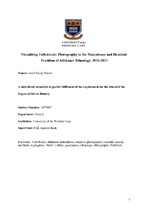Visualizing Volkekunde: Photography in the Mainstream and Dissident Tradition of Afrikaner Ethnology, 1920-2013
Abstract
This mini-thesis explores the role of photography in the mainstream and dissident tradition of Afrikaner ethnology (volkekunde) from the time of its establishment at Stellenbosch University in the 1920s through to its development at Pretoria University in the 1950s to 1970s, to its period of decline in the era of dissidence from the 1970s to the 2010s. I use a biographical approach, tracing the career biographies and photographic portfolios of three volkekundiges: the German-trained government ethnologist Nicolaas J. van Warmelo; little known dissident volkekundige Frans Hendrik Boot (1939-2010) who founded the Volkekunde Department at the University of the Western Cape in 1972 and for whom fieldwork photography was an expression of his humanist digression from the racialised mainstream volkekunde tradition; and Cornelis Seakle “Kees” van der Waal (1949-) whose ‘Long Walk from Volkekunde to Anthropology’ has been textually demonstrated but also takes on visual expressions in his use of photography. My thesis seeks to demonstrate that photography and visuality was important in displaying the different traditions of volkekunde. The central argument in this thesis postulates that fieldwork photographs, read in relation to the ethnographers intellectual focus offers us insight into an individual’s orientation. Furthermore this thesis explores the degree of a photographers technicality and aesthetics skill

